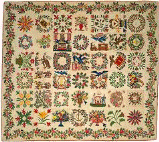Textile Society of America

Textile Society of America: Symposium Proceedings
Date of this Version
2008
Document Type
Article
Abstract
This documentary examines the process of naturally dyed carpet production in a village in the Milas region of southwest Turkey. In large numbers of villages of this region, carpet weaving is the household based work of every woman who lives there. The carpets made by these women will be used in their own homes, or play a role as a symbol of wealth within some spheres of the local economy as in the case of dowry or donations to a mosque, or they will be sold as a commodity outside of the village for cash.
In the modern era, the demand for Turkish carpets in Western countries facilitated many changes in the modes of production to increase yield and lower costs. One such change was the introduction of synthetic dyes. While all carpets produced in the villages of Turkey are hand made, the vast majority of them are made with synthetically dyed yarns purchased by the villagers.
The village that is the subject of this documentary is a rare case because carpets produced here are made with natural dyes. The film is structured around the complete production process of carpets in this village, beginning with the acquisition of the yarn, natural dying, preparation of the loom, and weaving. A final section explores the multiple roles carpets play in the lives of villagers.
While serving to illustrate in detail the methods of production, it is also an intimate portrait of village life, customs, and the social and cultural aspects surrounding carpet production in the Milas region.


Comments
Presented at Textile Society of America 11th Biennial Symposium: Textiles as Cultural Expressions, September 4-7, 2008, Honolulu, Hawai'i. Copyright © 2008 Ulara Tamura & John Wells